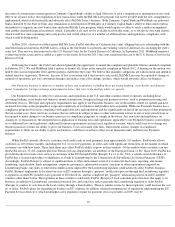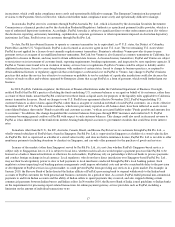eBay 2013 Annual Report Download - page 27
Download and view the complete annual report
Please find page 27 of the 2013 eBay annual report below. You can navigate through the pages in the report by either clicking on the pages listed below, or by using the keyword search tool below to find specific information within the annual report.
Government inquiries may lead to charges or penalties.
A large number of transactions occur on our websites and mobile platforms on a daily basis. Government regulators have received a
significant number of consumer complaints about our Marketplaces, Payments and Enterprise businesses, which, while small as a percentage of
our total transactions, are large in aggregate numbers. As a result, from time to time we have been contacted by various U.S. and foreign
governmental regulatory agencies that have questions about our operations and the steps we take to protect our users from fraud. PayPal has
received inquiries regarding its restriction and disclosure practices from the Federal Trade Commission and regarding these and other business
practices from the attorneys general of a number of states. In September 2006, PayPal entered into a settlement agreement with the attorneys
general of a number of states under which it agreed to pay $1.7 million to the attorneys general, shorten and streamline its user agreement,
increase educational messaging to users about funding choices and communicate more information regarding protection programs to users.
From time to time, we face inquiries from government regulators in various jurisdictions related to actions that we have taken that are
designed to improve the security of transactions and the quality of the user experience on our websites and we may face similar inquiries from
other government regulators in the future. For example, in 2008, the Australian Competition and Consumer Commission and the Reserve Bank
of Australia reviewed our policies requiring sellers to offer PayPal as a payment alternative on most transactions on our localized Australian
website and precluding sellers from imposing a surcharge or any other fee for accepting PayPal or other payment methods. From time to time,
other regulators have requested information concerning PayPal's limitations of customer accounts. Similarly, from time to time Bill Me Later has
received customer complaints that could result in investigations into Bill Me Later's business practices by state or federal regulators. As a result
of the U.S. credit crisis, new laws and regulations have been, and are expected to be, adopted and implemented that impose additional
obligations and restrictions on the provision of credit. On August 7, 2013 and January 13, 2014, we received Civil Investigative Demands (CIDs)
from the Consumer Financial Protection Bureau (CFPB) requesting that we provide testimony, produce documents and provide information
relating primarily to the acquisition, management, and operation of the Bill Me Later business, including online credit products and services,
advertising, loan origination, customer acquisition, servicing, debt collection, and complaints handling practices. We are cooperating with the
CFPB in connection with the CIDs. We are likely to receive additional inquiries from regulatory agencies in the future, including under new or
existing credit laws or regulations, relating to our business, products and services. We have responded to all inquiries from regulatory agencies
by describing our current and planned antifraud efforts, customer support procedures, operating procedures and disclosures of the relevant
business. If one or more of these agencies is not satisfied with our response to current or future inquiries, we could be subject to enforcement
actions, fines or other penalties, or forced to change our operating practices in ways that could harm our business. One or more of these agencies
also might take action against other companies with similar businesses which could force us to change our operating practices in ways that could
harm our business.
We are subject to general litigation and regulatory disputes.
From time to time, we are involved in other disputes or regulatory inquiries that arise in the ordinary course of business. These disputes
and inquiries include lawsuits by our users (individually or as class actions) alleging, among other things, improper credit and/or collection
activities; improper disclosure of our prices, rules or policies; that our prices, rules, policies or customer/user agreements violate applicable law;
that we have not acted in conformity with such prices, rules, policies or agreements; or violations of privacy laws and policies, including
violations of the Telephone Consumer Protection Act, 47 U.S.C. section 227 et seq. (TCPA), as discussed in more detail under the captions
“Changes in regulations, regulatory scrutiny, or user concerns regarding privacy and protection of user data could adversely affect our business,”
and “Our Payments business is subject to consumer protection laws and regulations”. The number and significance of these disputes and
inquiries continue to increase as our company has grown larger, our businesses have expanded in scope (e.g., our mobile, local, social and digital
initiatives and our continuing geographical expansion) and our products and services have increased in complexity. We have in the past been
forced to litigate such claims. We may also become more vulnerable to third-party claims as laws such as the Digital Millennium Copyright Act,
the Lanham Act and the Communications Decency Act are interpreted by the courts as our products and services to users continue to expand and
as we expand geographically into jurisdictions where the underlying laws with respect to the potential liability of online intermediaries such as
ourselves are either unclear or less favorable, as discussed in more detail under the caption “New and existing regulations could harm our
business”. As an increasing portion of our business shifts to mobile, we may be subject to additional laws and regulations, which may have
significant penalties. In addition, we are also subject to federal, state, local and foreign laws of general applicability, including laws regulating
working conditions.
Similar to several other technology companies, the U.S. Department of Justice (DOJ) and the State of California allege that we violated
U.S. and California antitrust law by agreeing not to recruit employees from other technology companies. We
25
























